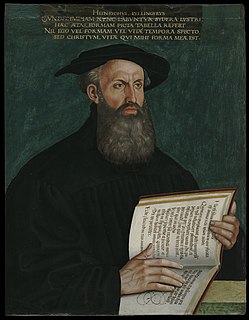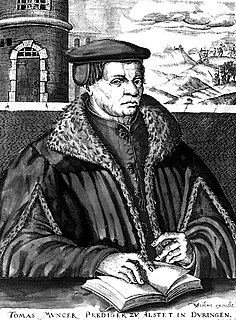Related Research Articles

Huldrych or Ulrich Zwingli was a leader of the Reformation in Switzerland, born during a time of emerging Swiss patriotism and increasing criticism of the Swiss mercenary system. He attended the University of Vienna and the University of Basel, a scholarly center of Renaissance humanism. He continued his studies while he served as a pastor in Glarus and later in Einsiedeln, where he was influenced by the writings of Erasmus.

CasparSchwen(c)kfeld von Ossig was a German theologian, writer, physician, naturalist, and preacher who became a Protestant Reformer and spiritualist. He was one of the earliest promoters of the Protestant Reformation in Silesia.

Heinrich Bullinger was a Swiss Reformer, the successor of Huldrych Zwingli as head of the Church of Zürich and former pastor at Grossmünster. As one of the most important reformers in the Swiss Reformation, Bullinger is known for co-authoring the Helvetic Confessions and his work with John Calvin on the real presence of Christ in the Eucharist.

Johannes Oecolampadius was a German Protestant reformer in the Calvinist tradition from the Electoral Palatinate. He was the leader of the Protestant faction in the Baden Disputation of 1526, and he was one of the founders of Protestant theology, engaging in disputes with Erasmus, Zwingli, Luther and Martin Bucer. Calvin adopted his view on the Eucharist dispute.

Thomas Müntzer was a German preacher and theologian of the early Reformation whose opposition to both Martin Luther and the Roman Catholic Church led to his open defiance of late-feudal authority in central Germany. Müntzer was foremost amongst those reformers who took issue with Luther's compromises with feudal authority. He became a leader of the German peasant and plebeian uprising of 1525 commonly known as the German Peasants' War. He was captured after the Battle of Frankenhausen, tortured and executed.

Johann Cochlaeus (Cochläus) was a German humanist, music theorist, and controversialist.

Andreas Rudolph Bodenstein von Karlstadt, better known as Andreas Karlstadt or Andreas Carlstadt or Karolostadt, or simply as Andreas Bodenstein, was a German Protestant theologian, University of Wittenberg chancellor, a contemporary of Martin Luther and a reformer of the early Reformation.
Francis Lambert was a Protestant reformer, the son of a papal official at Avignon, where he was born between 1485 and 1487.

Johann Faber was a Catholic theologian known for his writings opposing the Protestant Reformation and the growing Anabaptist movement.

Argula von Grumbach was a Bavarian writer and noblewoman who, starting in the early 1520s, became involved in the Protestant Reformation debates going on in Germany. She became the first Protestant woman writer, publishing letters and poems promoting and defending Martin Luther as well as his co-worker Philip Melanchthon and other Protestant groups. She is most known for directly challenging the University of Ingolstadt's faculty when she wrote a letter to them speaking out against the arrest of a Lutheran student. As one of the few women at the time openly speaking out her views, her writings sparked controversy and often became bestsellers, with tens of thousands of copies of her letters and poems circulating within a few years of their publication.

Stephan Agricola was a Lutheran church reformer. Born in Abensberg, at a young age he joined the Augustinian order. As a monk, he studied Augustine deeply. As a student, he went to the universities in Bologna and Venice, where in 1519 he became a Doctor of Theology. He began to preach on whole books of the Bible in 1520. He was led to Lutheranism through his study of Augustine's works on the scriptures. He was accused of Lutheranism as a heresy. Although he claimed his independence of Luther, he was arrested and imprisoned in Mühldorf on November 17, 1522. In 1523 he escaped and came to Augsburg, where with Urbanus Rhegius he fully accepted the Reformation and translated Johannes Bugenhagen's tract ag. Zwingjli into German. He was on the Lutheran side during the Marburg Colloquy, became pastor in Hof in 1532, took part in the meeting at Schmalkalden in 1537, and signed the Smalcald Articles. He was instrumental in introducing the Reformation in the Upper Palatinate, as he was pastor at Sulzbach beginning in 1542. During the Schmalkaldic War, he had to flee to Eisleben, where he died in old age on April 10–11, 1547. Stephen Agricola was a staunch uncompromising Lutheran, earnest and devoted. His son, Stephen, translated some of Luther's commentaries on the minor prophets.

Rudolf Gwalther (1519–1586) was a Reformed pastor and Protestant reformer who succeeded Heinrich Bullinger as Antistes of the Zurich church.
Adam Petri was a printer, publisher and bookseller.

Paul Speratus was a Swabian Catholic priest who became a Protestant preacher, reformer and hymn-writer. In 1523, he helped Martin Luther to create the First Lutheran hymnal, published in 1524 and called Achtliederbuch.
George of Polentz was bishop of Samland and Pomesania and a lawyer. He was the first Lutheran bishop and also a Protestant reformer.
Philip III, Count of Nassau-Weilburg was a Count of the Nassau-Weilburg. Among his major achievements were the introduction of the Reformation, the foundation of the Gymnasium Philippinum in Weilburg and the start of the construction of Schloss Weilburg.

Nikolaus Decius (also Degius, Deeg, Tech a Curia, and Nickel von Hof; c. 1485 – 21 March 1541 was a German monk, hymn-writer, Protestant reformer and composer.
Thomas Wyttenbach was one of the reformers of the city of Biel, Switzerland, during the Protestant Reformation.
The Reformation in Zürich was promoted initially by Huldrych Zwingli, who gained the support of the magistrates of the city of Zürich and the princess abbess Katharina von Zimmern of the Fraumünster Abbey, and the population of the city of Zürich and agriculture-oriented population of the present Canton of Zürich in the early 1520s. It led to significant changes in civil life and state matters in Zürich and spread to several other cantons of the Old Swiss Confederacy, and thus initiated the Reformation in Switzerland.
Johannes Sylvius Egranus was a German theologian, humanist, reformer and a friend of Martin Luther.
References
- ↑ Hans Volz, "Heinrich von Kettenbach" in Neue Deutsche Biographie, Volume 8 (1969), pp. 412-413.
- ↑ Christopher Close, The Negotiated Reformation: Imperial Cities and the Politics of Urban Reform, 1525-1550, (2009), p. 3.
- 1 2 Jakob Franck, "Heinrich von Kettenbach" in Allgemeine Deutsche Biographie, Volume 15 (1882), pp. 676-678.
- ↑ Peter Matheson, Rhetoric of the Reformation, (1998), pp. 81-111.